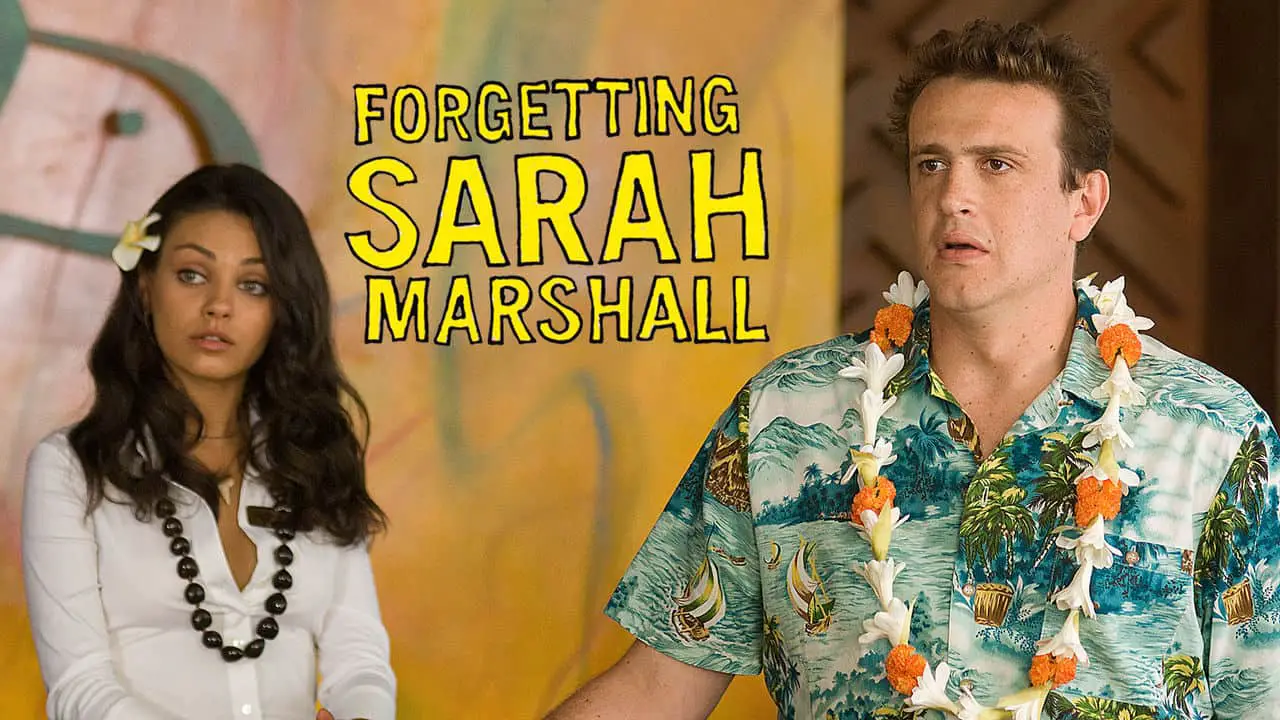Forgetting Sarah Marshall is a silly, fun film, designed to appeal to an audience of teenage boys. The film was produced by Judd Apatow. The script was written by its star, Jason Segel. Some critics have applauded the film for turning the ‘crazy ex-girlfriend’ trope on its head.
(Inversion does not equal subversion.)
I don’t aim to review the entire film because then I’d have to watch the entire film, but I’d like to offer a single scene as an example of storytelling which can have damaging real life consequences, depending on what the audience brings. https://youtu.be/c1JdnvJCVuI
In common with all Judd Apatow movies, beautiful young women are found at every turn and they all seem to find the underdog Joe Shmoe lead attractive. A classic male fantasy, it would seem.
The problem with this scene, even as fantasy: Jason Segel’s character appears before the receptionist as a stranger. He ‘just so happens’ to be holidaying at the very same resort. Next (as shown in the clip) he makes an awkward (but also really creepy) ironic joke about coming to the hotel to kill his ex-girifriend. Then he laughs, because OBVIOUSLY, that’s just a joke, right?
Any intelligent woman in Mila Kunis’s position would hear alarm bells. She already knows he can’t afford the only room available. She would back away from the desk and hope he leaves soon.
The statistics around stalking and real world intimate partner violence should shock us all. The most dangerous time for a woman — the time she’s most likely to be killed — is when she has just left a man who was formerly an intimate partner. (Rachel the receptionist knows exactly when this pair of strangers broke up because she’s just been told.)
Stalking is still not illegal in many countries, but this is slowly changing. Stalking became an offence in England and Wales in 2012. “About 120,000 victims, mostly women, were stalked every year.” Here in Australia, stalking laws were first introduced in the 1990s, but it has always been very difficult to prove someone’s behaviour constitutes stalking. “Stalking, as a discrete concept, is a surprisingly recent phenomenon, relatively unknown until towards the end of the 20th century.”
In Western society, we have a very strong cultural belief in the romance and intensity of unrequited love as a narrative that conveys magnificent emotional intensity of which humanity is capable. Whether this narrative ends in the object appreciating and reciprocating the love, or the subject dying nobly through loss of this love, the general theme is one which has gained cultural reification across the centuries, enough to be celebrated in literature, performance art and the continuation of historical accounts.
(For more on stalking in storytelling see my post The Ideology Of Persistence.)
The audience of Forgetting Sarah Marshall knows that Jason Segel’s character is not stalking his recent girlfriend. We know it’s a complete coincidence that he’s at the same hotel. There’s even a setting reason given for the coincidence.
But sometimes, in real life, like the receptionist in that scene, we encounter someone desperately looking for a family member. “Have you seen this woman?” he asks. “I’m so worried about her. I haven’t seen her in a week. I’m worried she may have done something stupid…”
If you ever encounter someone asking you that, I want you to use Rachel from Forgetting Sarah Marshall as your negative role model.
Never give details of a woman’s whereabouts to a man who is looking for her. She may have left him for a damn good reason. You can’t tell whether a man is dangerous from his affable Hawaiian shirt, his underdog sob story or his everyman looks. If you’re in attendance for an estranged couple’s encounter, do what you can to keep the woman safe. Maybe don’t check in her former boyfriend if you’re running a resort… because statistics.
It’s also possible a woman doesn’t need help in keeping safe. The backstory might be completely different. But that’s for the authorities to work out. In this scene, the look on Kristen Bell’s face offers more than enough information about her discomfort, and an empathetic character such as Rachel the receptionist would have picked that up.
I haven’t forgotten that these are fantasy women, written, directed and produced by men.
And if everyone watching that scene understood all of that about women and who tends to stalk and murder who, I might accept Forgetting Sarah Marshall as pure entertainment. Instead I worry that movie scripts function as subconscious real life scripts.
Story is powerful.

